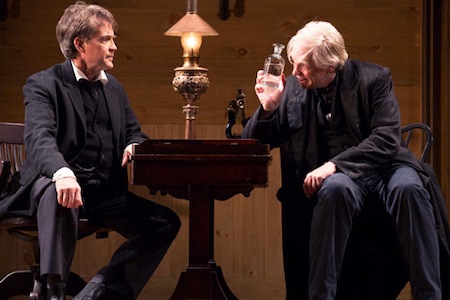Ibsen's "An Enemy of the People," More Relevant than Ever

An Enemy of the People
Samuel Friedman Theater
W. 47th Street
New York, N.Y.
A conscientious doctor discovers that the water in the world-famous baths of his city is so polluted by bacteria that it probably will kill people. Alarmed, he goes to the left-wing media and blows the whistle. The media wants to turn the tainted water into a sensational story. The city’s mayor, knowing the story, and the probable closing of the baths, will ruin the town’s economy, begs the doctor, who is also his brother, to relent. The doctor refuses. Then, on the day the story is ready to go to press, the mayor announces the only way to clean the baths is a huge property tax increase.
The crusaders, thinking about their pocketbooks, suddenly change their mind and leave the noble doctor well out on the proverbial limb.
Now, this sounds like any story from the last six months, right? It's the textbook whistleblower story. But this one was written in 1882 by Swedish playwright Henrik Ibsen. His baths are located in a small city on the southern Norwegian coast, and his crisis is (or rather was) real. What do people who know their baths are polluted do when they realize safe baths are going to cost each of them a considerable amount of money?
The answer is in this powerful new version of the Ibsen play, written by Rebecca Lenkiewicz, that will make theatergoers shudder. This 1880s play is as sharp and poignant as anything written this year. It is anti-government, anti-wealthy and anti-corporation. If the Occupy movement was around in Norway in 1882, they would've given this play an award.
The play stars Broadway veteran Boyd Gaines, who steals the show from co-star Richard Thomas. Gaines is the devoted Doctor Thomas Stockmann, a whirling dervish of righteousness and protest who storms his way about the stage, ratcheting the pace of the show up higher and higher with every loud turn.
And what of the whistleblowers, then and now? What happens to them? In the 1880s, Ibsen wrote that they lost everything -- jobs, fortunes, friends. They risked all and were ruined. There have been numerous whistlebowers in the U.S., from the days of the Industrial Revolution on. The early days of the twentieth century were marked by whistleblowers who disclosed unsafe conditions in U.S. factories. In the last days of the twentieth century there were several well known whistlesblowers, such as Frank Serpico (New York police corruption), Daniel Ellsberg (Pentagon Papers) and Karen Silkwood (nuclear power).
Today, there are federal laws and monetary settlements to protect whistleblowers, whom the media turns into public heroes. Recently, a whistleblower who exposed a huge aerospace company’s production of faulty parts for military satellite systems was awarded $48.7 million. A man who exposed fraud from a pharmaceutical giant was given $51.1 million. Another man who went public with proof of trouble with mass-marketed blood test kits earned $50 million. Just last week, Brad Birkenfeld was awarded a record $104 million by the Internal Revenue Service for exposing fraud at the UBS Bank in Switzerland. There are so many cases of whistle blowers today that some federal laws include a built in whistleblower’s fee of 15 to 20 percent of the judgment against the culprit.
And, in the end, face to face with what will happen when he goes to the government, or the media, how does the whistleblower think? In An Enemy of the People, Dr. Stockmann is resolute. He will stand defiant for the rest of his life, regardless of the consequences. Ibsen argues in his play that sometimes the majority, is wrong and we need to listen to the minorities.
Writer Lenkiewicz and director Doug Hughes need to be commended for taking a 130-year-old play and making it very modern. Hughes earns kukos, too, for making the many scenes of the play vivid and nicely connected to one another. Hughes gets the most out of the dynamic, stellar Gaines and the multi-talented Thomas. He also gets good performances from Randall Newsome as Captain Horster, and Kathleen McNenny and Maite Alina as the wives of the Stockmann brothers.
An Enemy of the People is a soul-searching history play about corruption and small-town politics that will make anybody sees it think about American whistleblowers today and what they do, and do not, accomplish.
